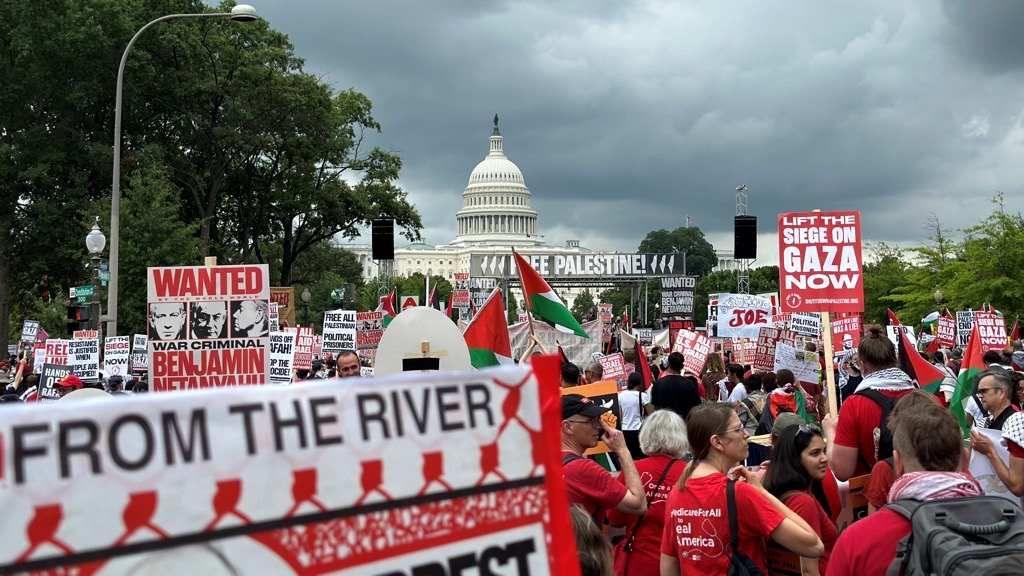Harris tells Netanyahu 'it is time' to end war in Gaza
Harris expresses concern over Gaza in talks with Netanyahu
- Published
US Vice-President Kamala Harris - who's expected to be the Democratic nominee for November's presidential election - has held what she called "frank and constructive" talks with Israeli Prime Minister Benjamin Netanyahu.
Striking a tougher tone than President Joe Biden, Ms Harris said she made clear her "serious concerns" about casualties in Gaza, telling Mr Netanyahu how Israel defended itself mattered.
"It is time for this war to end," she said after their face-to-face talks at the White House.
Ms Harris also stressed the need for a path to a two-state solution, while calling on Americans to be aware of "nuance" on the conflict.
Earlier on Thursday, Mr Netanyahu met Mr Biden, who stepped down from his re-election campaign on Sunday.
Mr Netanyahu's meetings at the White House came a day after he gave a fiery speech to Congress, vowing “total victory” against Hamas, as thousands of pro-Palestinian protesters demonstrated outside.
The prime minister faces pressure both at home and abroad to bring an end to the Israel-Gaza war, now in its ninth month.
'Thank you' - Netanyahu praises Biden's support to Israel
Mr Biden's staunch support of Israel has infuriated many left-wing activists, whose support the Democrats may need if they are to win November's presidential election.
Given that, there is also considerable interest in the position Ms Harris might take towards Israel should she replace Mr Biden in the White House.
After meeting Mr Netanyahu for about 40 minutes, Ms Harris said she had an "unwavering commitment" to Israel and its right to defend itself.
She noted the conflict began on 7 October when Hamas militants attacked southern Israel from Gaza, killing 1,200 people and taking more than 250 captives, according to Israeli tallies.
Israel's retaliatory offensive in Gaza has killed more than 39,000 people.
"Israel has a right to defend itself. And how it does so matters," Ms Harris said, expressing concern about the "dire humanitarian situation" in Gaza.
"We cannot allow ourselves to be numb to the suffering and I will not be silent," she said.
"Let's get the deal done so we can get a ceasefire to end the war," she added. "Let's bring the hostages home, and let's bring much-needed relief to the Palestinian people."
Mr Netanyahu is due to meet Republican presidential nominee Donald Trump on Friday.

Thousands gathered in Washington to protest against Netanyahu
As he met Mr Biden earlier, the prime minister said he had known him for 40 years - and that the US president had known every Israeli premier over the last half a century.
"From a proud Jewish Zionist to a proud Irish-American Zionist, I want to thank you for 50 years of public service and 50 years of support for the state of Israel," he said.
Mr Netanyahu also said he looked forward to working with Mr Biden "on the great issues before us" over the next several months.
The US president joked that Golda Meir was the first Israeli prime minister that he had met, and that Yitzhak Rabin, a successor, was there as an assistant.
At a news briefing, White House national security spokesman John Kirby said Mr Biden and Mr Netanyahu had discussed the urgent need for a hostage release deal, the potential of conflict spilling over into Lebanon, the threat of Iran and the need to reach "compromises" in peace talks.
While Mr Kirby added that "gaps remain" in the US-Israel relationship, it was still "healthy".
"By healthy, I mean they're not going to agree on everything," Mr Kirby said, adding that Mr Biden was "very comfortable with the relationship he has with the prime minister".
The US and Israeli leaders also held a closed-door meeting with the families of seven US citizens still being held hostage by Hamas in Gaza.
Following the meeting, Jonathan Dekel-Chen - whose son Sagui was kidnapped from Kibbutz Nir Oz on 7 October - told reporters that the meeting was "productive and honest". He did not provide further details.
"We feel probably more optimistic than we have since the first round of releases in late November, early December," he said.